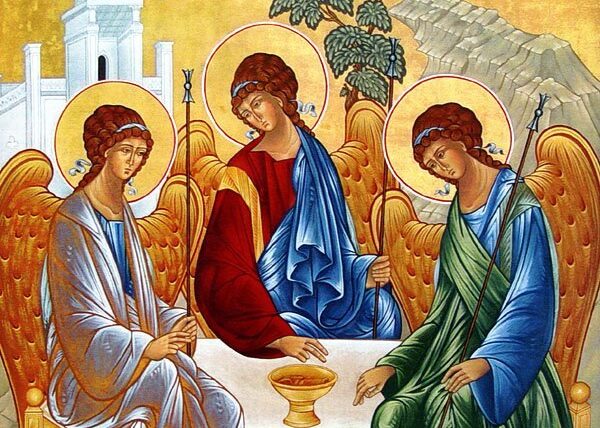If you asked most people off the street today, and perhaps even a lot of people in the pews on Sunday what the point of Christianity actually is, a LOT of people would respond with something along these lines:
‘The point of Christianity, and any religion for that matter, is to be a good person.’
If that is YOUR idea of what Christianity is, then I’m afraid to have to report that you are wrong. That would be the wrong idea. And what’s more (and this is even deeper), if that’s your idea of what Christianity is — then you are missing out.
Because the claim of Christianity is not that it just makes you a good person — pagan, pre-Christian philosophy ethics — the stuff that Aristotle and Plato taught us so long ago — THAT can get you to be a pretty good person. You don’t need Christianity to be a decently good person.
No! Christianity’s claim is much better. Much bigger. The Gospel of Jesus Christ says that we can become, by God’s free gift of grace, partakers in the Divine Nature. Participants in Divine Life itself.
The name that we give this shocking claim is “divinization.”
St. Athanasius once boiled it down to these brilliant and yet startling words. He said tat “God became man so that man might become God.”
God became man, so that man might become God. In order to properly understand those words, we have to have a much bigger idea of Christianity than being a “good person,” don’t you think?
And yet, this is what we boldly profess as we await the birth of Jesus this Advent — The Son of God took on the lowliness of our human flesh — he came and he dwelt in the womb of the Blessed Virgin Mary. He took on a human nature, so that we could take on the glory of HIS divinity!
He took from us what is ours, so he could give what was his to us.
That’s what our gorgeous first reading from the book of Baruch is getting at. And it’s very special that we even hear from the book of Baruch. It’s one of the Deuterocanonical books not found in Protestant bibles. The only other time we hear from Baruch in the entire liturgical cycle is at the Easter Vigil. So this is very special. And what Baruch is getting at is just this:
Divinization.
The inspired author prophecies of a future time in which we will be able to “take off [our] robes of mourning and misery” and finally be able to “put on the splendor of glory from God forever.”
That is a huge claim!
What Baruch is grasping at, with words that inevitably fall short of the reality they are describing, is participating IN God’s glory. Becoming partakers in the Divine Nature.
In the waters of baptism, our old life died. And the new life we now live is not our own, but the life of Jesus — God-made-flesh. Humanity united with divinity.
Maybe all of this seems outrageous to you. Maybe it even sounds a little blasphemous — God became man, so that man can become God. Only God is God, right father? Well — it all lies in the word “participation.”
Because it’s not our nature to be divine. We’re creatures. But God the Creator wants to share with us what is His.
Maybe it sounds too good to be true? Maybe it’s like what our Psalm said: “It seemed like we were dreaming!”
But the refrain we sang is more true than we can ever fully appreciate: “The Lord has done great things for us; we are filled with joy.”
We are filed with — Divine Joy! Divine Life!
The words of Baruch come to mind again: “Up, Jerusalem! Stand upon the heights,” he says! Up, Church of God! Up, Christians! Up! Stand upon the heights of so great and deep a mystery! Don’t fall back into that lame, uninspiring, boring version of the gospel that settles for being a kind-of-a-good person. That fails to propel us to the heights!
Trust in the Lord who took on human flesh for YOU and for me.
Because as Saint Paul told us in our Second Reading, “I am confident of this, that the one who began a good work in you — BEGAN it in the waters of baptism, the waters of conversion… THAT one — will continue to complete it until the day of Christ Jesus.”
God means to complete His work in YOU.
And that work is nothing less than the splendor of the glory of God alive in you for the rest of eternity. That’s what it means, ultimately, to be a saint — to have Divine Life — the life of Father, Son, and Holy Spirit — filling you, pulsating within you, empowering you to live forever.
We’re just little creatures, right? We can’t live forever on our own steam. We have to share in God’s forever-life if we want to live forever.
“This is my prayer,” Paul then writes, “that your love may increase ever more and more,” and more… and MORE… Because God is INFINITE right? That your love may increase to become infinite — even as God is infinite! “That you will be “filled with the fruit of righteousness that comes through Jesus Christ for the glory and praise of God.”
Paul clearly is not just praying for us that we would be “really good” people. He’s praying that we might become holy, as God Himself is holy. He’s praying that we might be “divinized” by the grace of God dwelling in us by virtue of our baptism and our participation in the Sacraments of Christ’s Church.
CS Lewis, with his usual knack for capturing really hard concepts with simple, clear words, once wrote that everyone we meet is a potential god or goddess. Think about that the next time you go to Panera, or when you are doing your Christmas shopping… Remember it the next time somebody cuts you off in traffic: “There are no ordinary people,” CS Lewis reminds us. We are surrounded by immortal beings, that, one day, we pray will become “creature(s) which, if you saw [them], you would be strongly tempted to worship.”
That’s the brilliance and beauty of a saint, fully alive with God’s love and goodness pulsating within them. We’d be tempted to worship them!
Again, Lewis is describing divinization — that amazing truth that the Divine Life will be so clear in the Saints, that we might even mistake them for God Himself!
If only this fact could truly sink in! If only we would really take that seriously — How differently we might begin to treat the people around us: If we could only see that every single person God has ever created is meant to be united perfectly with God.
But of course… right now, we are all works in progress. We’re on the way, and we have a LONG way to go. But thank God, Jesus is along the ride with us!
And what that means in practice is that we need to REPENT. We need to hear and put into practice John the Baptist’s desperate cry from our Gospel:
“Prepare the way of the Lord!”
Make room in your hearts for this vast, burning, loving, patient, holy Divine Life to come and enter into you! Because our hearts are too small! God can’t fit. We have too much else still in our hearts — too many attachments! Too much love for own particular flavor of sin.
Like the Holy Family on the first Christmas night, God’s grace comes knocking on your heart only to find that there’s no room in the inn! There’s no room for Christ’s Divinity in us.
So, we need to set to work, with God’s grace, making room, don’t we? We need to empty ourselves, so that the Divine Life can come and dwell in us. We have to die, so that Jesus can live in us.
St. John of the Cross uses a very helpful image to describe the process of “preparing the way” — of “making room” for the Lord.
He gives us the image of a glass window.
The light of God is shining on that glass window of your soul at all times. We can’t stop the sun from shining. But as it is, we have so much dust, and so much mud, and cobwebs, and dirt caked and smeared on that window, that the light — the constant, and pure light — simply can’t get through.
Our job, therefore, is to work with God’s grace to have that window cleared away, and — in the end — made perfectly clean.
That’s part of what John the Baptist is getting at when he’s saying: Prepare the way of the Lord! Let every valley be filled
Every mountain and hill shall be made low.”
That the “winding roads shall be made straight,
and the rough ways made smooth.”
Everything has to change. Everything has to get out of the way. Everything must go, if God’s life is gonna be IN us and have full access to every corner of our lives.
If that should happen to our soul — what a beautiful sight! What an overwhelmingly bright and glorious thing we become! The clean, clear, perfectly purified glass window of our soul would be so filled with God’s light, that it BECOMES light. We become invisible. We draw no attention to ourselves, and only God’s glory would be proclaimed.
So we need to REPENT. We need to turn away from the stuff clinging to us, and preventing the light from shining through us. We have to renounce and reject sin.
Have you ever prayed like that?
In the Name of Jesus, I renounce laziness.
In the Name of Jesus, I reject pride, bitterness, and jealousy.
In the Name of Jesus, I renounce gossip.
In the Name of Jesus, I reject and renounce lustful thoughts and impure actions.
In the Name of Jesus, I renounce all this stuff, because I just want YOUR life in me.
He who has begun the good work in you will finish it if you allow Him to.
And (this is the last thing) — You are in the right place to let Him do that.
You are in the liturgy right now. You are uniting yourself with the Sacrifice of Jesus on the altar of God, and THAT is where a chaotic, disordered, and. Broken world is made whole. That’s where our disordered souls get re-ordered — Because we are pointing towards Him.
That reading from Baruch said: “Up, Jerusalem! stand upon the heights; look to the east!” The Catholic liturgy for the longest time was pointing in the same direction — pointing to the East. Some people will describe it as if the priest is facing away from the people. Well, actually, he’s facing God. He’s looking to the Lord WITH the people.
When we have our eyes fixed on God together, then we can look forward to the good work that God has begun in us, coming to completion.
So receive the Eucharist today, knowing it’s God’s good work in you. He means to fill you with His Real Presence. His Divine Life.





Leave A Comment